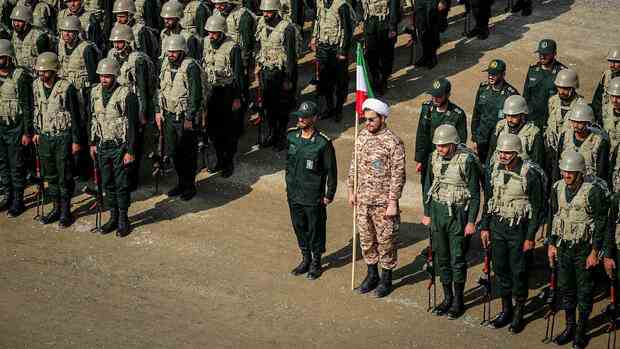Tehran Shortly before the death of the influential commander Ghassem Soleimani, preparations for funeral events in Iran are in full swing. It has been three years since the Revolutionary Guards general was killed in a US drone strike on January 3 in neighboring Iraq. In the capital Tehran, a fresh portrait of Soleimani is emblazoned on a huge banner next to historical resistance fighters. System followers worship him as a hero and martyr. But this year everything is different.
The Revolutionary Guards Corps (IRGC) are Iran’s elite force. Founded by Ayatollah Ruhollah Khomeini after the Islamic Revolution in 1979, the unit is intended to prevent a coup and protect the state ideology. Hundreds of thousands of auxiliaries are under the IRGC’s command, including the notorious Basij militias who have recently been involved in the brutal crackdown on protests. The commander-in-chief is Iran’s head of state, Ali Khamenei, who has the final say in all strategic matters.
In the past few decades, the Revolutionary Guards have not only been upgraded militarily, they have also expanded their social and economic influence. Today, supporters of the IRGC are considered an economic powerhouse, with holdings in hotel chains, mobile phone companies and airlines, among others.
At the same time, they control parts of the economy, which has been hit by harsh international sanctions. An insider in Tehran called the guards “the engine of the Islamic Republic.”
Top jobs of the day
Find the best jobs now and
be notified by email.
It was no coincidence that General Soleimani was killed in neighboring Iraq. As commander of the Al-Quds Brigades, the IRGC’s overseas force, the veteran had been expanding Tehran’s influence in the region since the 1990s.
The charismatic commander has been on military and diplomatic missions time and again, most recently in Iraq’s capital Baghdad. For many Shiites in the region, Soleimani was “a mixture of James Bond, Erwin Rommel and Lady Gaga,” former CIA expert Kenneth M. Pollack wrote years ago in Times magazine.
Revolutionary Guard officers are fearless
Whether Iraq, Syria or Lebanon: Tehran relies on allies in politics and the support of Shiite militias. The Islamic Republic also wants to use this to arm itself against its arch-enemy Israel. After Soleimani’s death in 2020, the nation mourned, including not only loyal system supporters.
The death of the commander of the Revolutionary Guards shook the country.
(Photo: dpa)
But today there is little evidence of social outrage over the airstrike ordered by former US President Donald Trump. Many Iranians are now also blaming the Revolutionary Guards for social problems.
IRGC officers are aware of the criticism. But the military leadership is undaunted by this. “We too know the problems, the dollar exchange rate and the prices in the supermarkets,” asserts the insider from Tehran.
>> Read here: Comment: If the West takes its own values seriously, it must stand up for the Iranian women
From the point of view of the Revolutionary Guards, this is the tribute for independence from great powers, above all from the arch-enemy USA. “May the supporters of system change live in an unsafe country just because they don’t want to wear headscarves or don’t like clerics?”
Members of the Basij paramilitary force, affiliated with the Revolutionary Guard, in Tehran.
(Photo: dpa)
Many compatriots are now critical of whether the Revolutionary Guards are making Iran a safer country. Above all, the expansive commitment in the Middle East and the support of militant Shiites have led to tensions in foreign policy, critics say. And last but not least, the violent suppression of the protests is leading to a major social divide, complain Iranians from different walks of life.
>> Read here: Trump’s ex-security adviser on Iran: “Suddenly it’s ‘death to the ayatollah’ and no longer ‘death to America'”
In view of the numerous human rights violations since the demonstrations broke out in mid-September, the EU has imposed sanctions on many high-ranking officers of the Revolutionary Guards. But for some politicians and activists, that doesn’t go far enough: they keep calling for the IRGC to be classified as a terrorist organization. The USA had already taken the step under Donald Trump in 2019.
While Soleimani continues to be honored as the “master of the resistance” at nationwide funeral marches, opponents of the system also show their rejection of the Revolutionary Guards with protest actions. Posters and portraits of the general with the white hair and beard mark the anniversary of his death, but some banners have been set on fire or sprayed with red paint over the past few weeks. The message of the demonstrators: “There is blood on your hands.”
More: West has been exerting pressure for years – why sanctions against the mullah regime are failing
